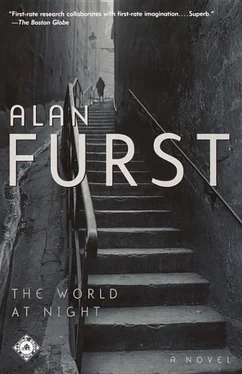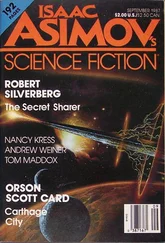Alan Furst - The World at Night
Здесь есть возможность читать онлайн «Alan Furst - The World at Night» весь текст электронной книги совершенно бесплатно (целиком полную версию без сокращений). В некоторых случаях можно слушать аудио, скачать через торрент в формате fb2 и присутствует краткое содержание. Жанр: Шпионский детектив, на английском языке. Описание произведения, (предисловие) а так же отзывы посетителей доступны на портале библиотеки ЛибКат.
- Название:The World at Night
- Автор:
- Жанр:
- Год:неизвестен
- ISBN:нет данных
- Рейтинг книги:5 / 5. Голосов: 1
-
Избранное:Добавить в избранное
- Отзывы:
-
Ваша оценка:
- 100
- 1
- 2
- 3
- 4
- 5
The World at Night: краткое содержание, описание и аннотация
Предлагаем к чтению аннотацию, описание, краткое содержание или предисловие (зависит от того, что написал сам автор книги «The World at Night»). Если вы не нашли необходимую информацию о книге — напишите в комментариях, мы постараемся отыскать её.
The World at Night — читать онлайн бесплатно полную книгу (весь текст) целиком
Ниже представлен текст книги, разбитый по страницам. Система сохранения места последней прочитанной страницы, позволяет с удобством читать онлайн бесплатно книгу «The World at Night», без необходимости каждый раз заново искать на чём Вы остановились. Поставьте закладку, и сможете в любой момент перейти на страницу, на которой закончили чтение.
Интервал:
Закладка:
The day was fine, cool and sunny, and he liked to walk to his office, just off the Champs-Elysees on the rue Marbeuf. Like it or not, his usual cabdriver was not at his customary spot on the place Iena so it was walk or take the Metro, and this was no morning to be underground. Somewhere along the way, he would stop for a coffee.
He was, to all appearances, a typical Parisian male on his way to the office. Dark hair, dark eyes-France a Latin country after all-some concealed softness in the face, but then, before you could think about that, a small scar beneath one eye, the proud battle trophy of soccer played with working-class kids when he was young, in fact the most violent moment he’d ever experienced.
In real life, anyhow. Last Train to Athens had a murder in an alley in the Balkans, pretty nasty by the time they’d got it cut. Emil Cravec! What a ferocious mug on him-where the hell was he, anyhow? No Way Out was tame by comparison, except for the ending. Michel Faynberg had directed for him, and Michel had never really left the Sorbonne. He’d had the hero clubbed to death at the base of a statue of Blind Justice-what a load of horseshit! No Way to Make Money the exhibitor Benouchian called it. Yet, in all fairness, that hadn’t really turned out to be true. The students went.
He liked Night Run best of all, he loved that movie. It was better than The Devil’s Bridge, which had got him the little house in Deauville. He’d almost directed Night Run, stood with old Marchand all day long, watched rushes with him every night. Marchand was a legend in the industry, and the great thing about stature, Casson had discovered, was that egoism was no longer the issue-now and then, anyhow. Even a producer, despised moneyman, might have an idea that was worth something. Marchand had been in his seventies by then, was never going to get the acclaim he deserved. White hair, white beard, eyes like a falcon. “Tiens, Casson,” he’d said. “You really want it right.”
It was, too. The smoke that billowed from the locomotive, the little cello figure, the village scenes they shot around Auxerre-every frame was right. A small story: beginning, middle, end. And Marchand had found him Citrine. She’d had other names then, what she’d come north with, from Marseilles. But that was eleven years ago, 1929, and she’d been eighteen. Or so she said.
Casson strode along, through the open-air market on the place Rochambeau. The fish stall had a neat pile of fresh-caught rouget on chipped ice. Gray and red, with the eye still clear. A goat was tied to the back of a wagon and a young girl was milking it into a customer’s pail. The market cafe had tables and chairs out on the sidewalk, the smell of coffee drawing Casson to the zinc bar. He stood between a secretary and a man with red hands and a white apron. Unwrapped the sugar cube and set it on the spoon and watched the walls crystalize and tumble slowly down as the coffee rose up through it. He brought the cup to his lips: hot, black, strong, burnt. Casson allowed himself a very private little sigh of gratitude. To be alive was enough.
Ah, a band.
Casson stopped to watch. A unit of mounted Gardes Republicains in hussars’ uniforms, chin straps tight beneath the lower lip. On command they rode into formation, three lines of ten, horses’ hooves clopping on the cobbled street. Then played, with cornets and drums, a spirited march. In the crowd, a veteran of the 1914 war, the tiny band of the Croix de Guerre in his lapel, stood at rigid attention, white hair blowing in the breeze from the river, left sleeve pinned to the shoulder of his jacket.
Now the band played the “Marseillaise,” and Casson held his hand over his heart. War with Germany, he thought, it doesn’t stop. They’d lost in 1870, won-barely-in 1918, and now they had to do it again. A nightmare: an enemy attacks, you beat him, still he attacks. You surrender, still he attacks. Casson’s stomach twisted, he wanted to cry, or to fight, it was the same feeling.
28, rue Marbeuf.
Turn-of-the-century building, slate gray, its entry flanked by a wholesale butcher shop and a men’s haberdashery. Marbeuf was an ancient street, crowded and commercial, and it was perfect for Casson. While the big production studios were out at Joinville and Billancourt, the offices of the film industry were sprinkled through the neighborhood in just such buildings. Not on the Champs-Elysees, but not far from it either. Honking trucks and taxis, men carrying bloody beef haunches on their shoulders, fashion models in pillbox hats.
To get to Casson’s office you went to the second courtyard and took the east entry. Then climbed a marble staircase or rode a groaning cage elevator an inch at a time to the fourth floor. At the end of a long hall of black-and-white tile: a sugar importer, a press agent, and a pebbled glass door that said Productions Casson.
He was also PJC, CasFilm, and assorted others his diabolical lawyers thought up on occasions when they felt the need to send him a bill. Nonetheless, the world believed, at least some of the time. Witness: when he opened the door, eight heads turned on swivels. It brought to mind the favorite saying of an old friend: “One is what one has the nerve to pretend to be.”
As he went from appointment to appointment that morning, he began to get an idea of what the war might mean to him personally. For one thing, everybody wanted to be paid. Now. Not that he blamed them, but by 11:30 he had to duck out to Credit Lyonnais to restock the checking account from reserves.
When he returned, the scenic designer Harry Fleischer sat across the desk and bit his nails while Gabriella prepared a check: 20,000 francs he was owed, and 20,000 more he was borrowing. “I can’t believe this is happening,” he said gloomily. “My wife is home, selling the furniture.”
“I wish I knew what to say.”
Fleischer made a gesture with his hand that meant just because I am this person. He was heavy, face all jowls and cheeks, with a hook nose, and gray hair spreading back in waves from a receding hairline. “I ran from Berlin in 1933, but I thought: so, I have to live in Paris, the whole world should be tortured like this.”
“Where are you going?”
“Hollywood.” Fleischer shook his head in disbelief at what life did. “Of course I could say ‘ Hollywood !’ I know plenty of people who’d see it that way. But I’m fifty-six years old, and what I’ll be is one more refugee. Arthur Brenner has been trying to get me to come to MGM for years. Well, now he’ll get. I don’t want to leave, we made a life here. But if these momsers do here what they did in Poland …”
There was a big, dirty window behind Casson’s chair, open a few inches. Outside was the sound of life in the Paris streets. Casson and Fleischer looked at each other-that couldn’t end, could it?
“What about you?” Fleischer said.
“I don’t know. Like last time-the thing will settle into a deadlock, the Americans will show up.” He shrugged.
Gabriella knocked twice, then brought in Fleischer’s check. Casson signed it. “I appreciate the loan,” Fleischer said, “It’s just to get settled in California. What is it in dollars, four thousand?”
“About that.” Casson blew on the ink. “I don’t want you to think about it. I’m not in a hurry. The best would be: we give Adolf a boot in the ass, you come back here, and we’ll call this the first payment on a new project.”
Casson handed the check to Fleischer, who looked at it, then put it in the inside pocket of his jacket. He stood and extended a hand. “Jean-Claude,” he said. That was Casson’s affectionate nickname, in fact his first and middle names.
Читать дальшеИнтервал:
Закладка:
Похожие книги на «The World at Night»
Представляем Вашему вниманию похожие книги на «The World at Night» списком для выбора. Мы отобрали схожую по названию и смыслу литературу в надежде предоставить читателям больше вариантов отыскать новые, интересные, ещё непрочитанные произведения.
Обсуждение, отзывы о книге «The World at Night» и просто собственные мнения читателей. Оставьте ваши комментарии, напишите, что Вы думаете о произведении, его смысле или главных героях. Укажите что конкретно понравилось, а что нет, и почему Вы так считаете.












